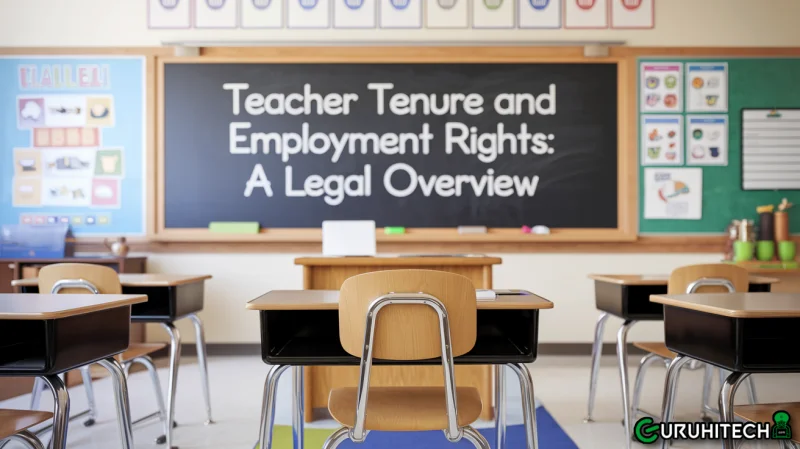Teacher Tenure and Employment Rights: A Legal Overview

Teacher tenure is a significant employment right designed to provide educators with job security and protect them from arbitrary dismissal. It originated in the late 19th and early 20th centuries in response to concerns that teachers, especially women, could be dismissed for personal reasons, political views, or unfair performance evaluations. Today, tenure is an essential aspect of employment for many educators, but it comes with its own set of legal implications.
What Is Teacher Tenure?
Teacher tenure is a legal status that educators achieve after successfully completing a probationary period. It grants them a higher level of job security and protection against dismissal without “just cause.” Typically, tenure is obtained after a set number of years—usually between two to five—of satisfactory teaching performance. Once teachers are tenured, they can only be fired or disciplined under specific circumstances, and often only after a formal legal process.
Legal Benefits of Teacher Tenure
Protection from Unjust Dismissal: Tenured teachers cannot be dismissed without just cause. This means that school administrators must provide legitimate reasons, such as incompetence, misconduct, or financial necessity, and often must prove these grounds in a legal setting before terminating a teacher’s employment.
Due Process: If a tenured teacher faces disciplinary action or termination, they are entitled to a due process hearing. This process often includes notification of the charges, the opportunity to defend themselves in front of a board or neutral arbiter, and, in some cases, the right to legal representation.
Academic Freedom: Tenure also protects teachers from being dismissed due to their viewpoints or teaching materials, fostering academic freedom. Educators can explore controversial topics and ideas without fear of retaliation from school boards or administrations, as long as they adhere to school policies and curriculum guidelines.
The Legal Framework Behind Teacher Tenure
Teacher tenure laws are primarily state-based, meaning that the specifics can vary from state to state. These laws are often written into state education statutes and union contracts. However, they generally share the same goal: balancing the rights of teachers to job security with the need for school systems to remove ineffective educators. To find out more contact an education lawyer in Connecticut.
State Legislation: Many states have enacted specific laws that outline the rights and responsibilities of tenured teachers. For example, states like New York, California, and Illinois have comprehensive tenure laws that include probationary periods, the reasons for which a tenured teacher can be dismissed, and the due process rights of tenured educators.
Collective Bargaining Agreements: Teacher unions often negotiate tenure rights through collective bargaining agreements with school districts. These agreements may cover additional employment protections, evaluation procedures, and the appeals process for any adverse actions taken against teachers.
Challenges and Criticisms of Teacher Tenure
While tenure provides critical protections for educators, it has also faced criticism. Detractors argue that tenure can make it more difficult for schools to remove underperforming teachers, negatively impacting student outcomes. Legal battles in states like California and New York have brought the issue to the forefront, questioning whether tenure laws unfairly protect ineffective educators at the expense of students’ rights to quality education.
Difficulty in Removing Tenured Teachers: Some argue that the legal process required to dismiss a tenured teacher can be lengthy and expensive. School districts must often gather extensive evidence, provide multiple opportunities for improvement, and undergo lengthy hearings before a decision is made, leading to delayed resolutions.
Educational Impact: Critics suggest that ineffective teachers may remain in the classroom longer due to tenure protections, hindering student performance. While proponents of tenure argue that it ensures teachers are not unjustly removed, opponents feel that the system can sometimes protect individuals who should not remain in the profession.
Conclusion
Teacher tenure remains a crucial aspect of employment rights in the education system, offering job security and protections from arbitrary dismissal. However, it operates within a complex legal framework and faces ongoing debate about its implications for teacher performance and student outcomes. As tenure laws continue to evolve, striking a balance between protecting teachers’ rights and ensuring educational quality for students will be a central focus of future legal developments.
Ti potrebbe interessare:
Segui guruhitech su:
- Google News: bit.ly/gurugooglenews
- Telegram: t.me/guruhitech
- X (Twitter): x.com/guruhitech1
- Bluesky: bsky.app/profile/guruhitech.bsky.social
- GETTR: gettr.com/user/guruhitech
- Rumble: rumble.com/user/guruhitech
- VKontakte: vk.com/guruhitech
- MeWe: mewe.com/i/guruhitech
- Skype: live:.cid.d4cf3836b772da8a
- WhatsApp: bit.ly/whatsappguruhitech
Esprimi il tuo parere!
Ti è stato utile questo articolo? Lascia un commento nell’apposita sezione che trovi più in basso e se ti va, iscriviti alla newsletter.
Per qualsiasi domanda, informazione o assistenza nel mondo della tecnologia, puoi inviare una email all’indirizzo [email protected].
Scopri di più da GuruHiTech
Abbonati per ricevere gli ultimi articoli inviati alla tua e-mail.
